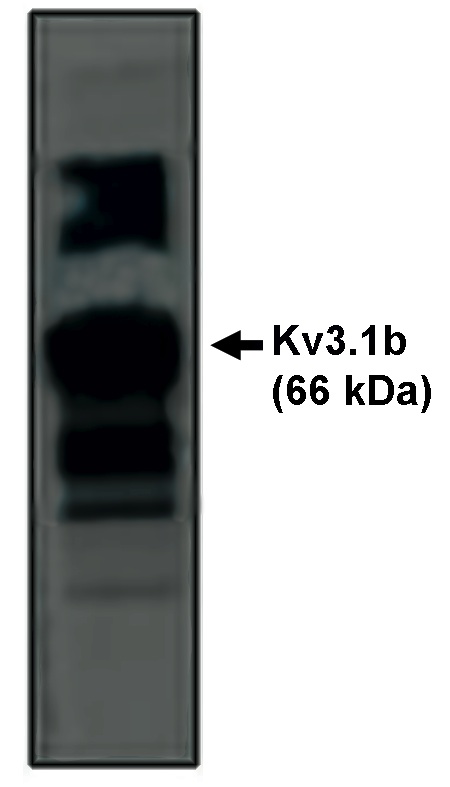Catalogue

Rabbit anti Rat Kv3.1b Potassium Channel
Catalog number: X1504P| Isotype | IgG |
| Product Type |
Polyclonal Antibody |
| Units | 100 µg |
| Host | Rabbit |
| Species Reactivity |
Human Mouse Rat |
| Application |
Western Blotting |
Background
The Kv3.1b potassium channel is a voltage-gated channel protein which belongs to the delayed rectifier class and to the Shaw potassium channel subfamily. Potassium channels are mainly found in plasma membranes but are not generally distributed over the cell surface. Potassium channels catalyze the rapid permeation of potassium ions while rejecting biologically abundant potential competitors such as sodium, calcium and magnesium. Ion selectivity and high through put rate of potassium channels is accomplished by precise co-ordination of dehydrated potassium by the protein and multiple ion occupancy within the permeation pathway. All potassium channels carry out the formation of a transmembrane leak specific for potassium ions. Since cells almost universally maintain cytoplasmic potassium concentrations higher than those extracellularly, the opening of a potassium channel implies a negative ongoing change in electrical voltage across the cell membrane. This may result in termination of the action potential of electrically excitable cells including nerve, muscle and pancreatic beta cells. In nonÐexcitable cells, potassium channels play important roles in the cellular potassium recycling required for electrolyte balance effected by the renal epithelium.
Source
Rabbits were immunized with a synthetic peptide derived from the rat Kv3.1b potassium channel conjugated to KLH
Product
Provided as solution in phosphate buffered saline with 0.08% sodium azide
Product Form: Unconjugated
Purification Method: Ammonium Sulfate Precipitation
Concentration: See vial for concentration
Specificity
Rabbits were immunized with a synthetic peptide comprising residues 567–585 of the intracellular C-terminus of the rat Kv3.1b isoform. In rat the two major splice isoforms Kv3.1a and Kv3.1b differ at the cytoplasmic C-terminal domain, which is longer in the Kv3.1b isoform. The peptide for immunization of the rabbits was therefore chosen to recognize this additional sequence in the Kv3.1b isoform.
Applications
This antibody can be used for Western blotting (5-10 µg/ml). Optimal concentration should be evaluated by serial dilutions.
Functional Analysis: Western Blotting
Positive Control: Rat brain lysate
Storage
Product should be stored at -20°C. Aliquot to avoid freeze/thaw cycles
Product Stability: See expiration date on vial
Shipping Conditions: Ship at ambient temperature, freeze upon arrival
Caution
This product is intended FOR RESEARCH USE ONLY, and FOR TESTS IN VITRO, not for use in diagnostic or therapeutic procedures involving humans or animals. It may contain hazardous ingredients. Please refer to the Safety Data Sheets (SDS) for additional information and proper handling procedures. Dispose product remainders according to local regulations.This datasheet is as accurate as reasonably achievable, but Nordic-MUbio accepts no liability for any inaccuracies or omissions in this information.
References
1. Luneau,C.Jet.al. 'Alternative splicing contributes to K+ channel diversity in the mammalian central nervous system.' Proc. Natl. Acad. Sci. U.S.A. 88 (9), 3932-3936 (1991)
2. Rettig, J et.al 'Characterization of a Shaw-related potassium channel family in ratbrain' EMBO J. 11 (7), 2473-2486 (1992)
3. Hartig,W.et.al 'Perineuronal nets in the rat medial nucleus of the trapezoid body surround neurons immunoreactive for various amino acids, calcium-binding proteins and the potassium channel subunit Kv3.1b.' Brain Res. 899(1-2):123-33 (2001)
4. Osipenko,OH et.al Potential role for kv3.1b channels as oxygen sensors.Circ Res.;86(5):534-40 (2000)
Protein Reference(s)
Database Name: SwissProt
Accession Number: P25122
Species Accession: Rat
Safety Datasheet(s) for this product:
| NM_Sodium Azide |

" Western blot analysis using Kv3.1b antibody on rat brain lysate."

